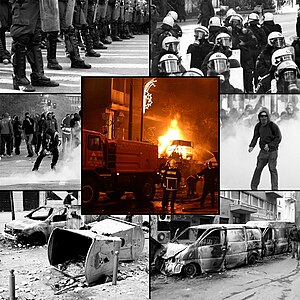Alexandros Grigoropoulos
| 2008 Greek riots | |
|---|---|

Clockwise, from top left: riot police face protesters; police move in to contain rioting civilians; a protester defies police; burned-out vans; an abandoned barricade; and protesters retreat from tear gas
|
|
| Date | December 2008 |
| Location | Greece |
| Caused by |
|
| Goals |
|
| Methods |
|
| Resulted in | Two special guards found guilty |
The 2008 Greek riots started on 6 December 2008, when Alexandros Grigoropoulos (Greek: Αλέξανδρος Γρηγορόπουλος), a 15-year-old Greek student, was killed by two special officers in Exarcheia district of central Athens. The murder of a young student by police resulted in large protests and demonstrations, which escalated to widespread rioting, with numerous rioters damaging property and engaging riot police with Molotov cocktails, stones and other objects. Demonstrations and rioting soon spread to several other cities, including Thessaloniki, the country's second-largest city. Outside Greece, solidarity demonstrations, riots and, in some cases, clashes with local police also took place in more than 70 cities around the world, in Europe including Amsterdam, Barcelona, Berlin, Bordeaux, Brussels, Cologne, Copenhagen, Dublin, Frankfurt, the Hague, London, Madrid, Nicosia, Paphos, Paris, Rome and Seville and globally from São Paulo, San Francisco and Wellington to Buenos Aires and Siberia. Newspaper Kathimerini called the rioting "the worst Greece has seen since the restoration of democracy in 1974".
While the unrest was triggered by the shooting incident, commentators described the reactions as expressing deeper causes as well, especially a widespread feeling of frustration in the younger generation about specific economic problems of the country (partly as a result of the global economic crisis), a rising unemployment rate among the young generation and a perception of general inefficiency and corruption in Greek state institutions.
The fatal shooting that triggered the riots and protests took place in the evening of 6 December 2008, shortly after 9 pm, in the Exarcheia district of central Athens.
According to press reports, two Special Guards (Ειδικοί Φρουροί) (a special category of the Greek police personnel, originally meant for guard duties on public property) had been engaged in a minor verbal clash with a small group of teenagers in a main street of Exarcheia, outside a shop. On driving away in their police car, they were then confronted by another small group at a nearby street crossing. The two guards were ordered by the Greek police center of operations to disengage immediately and withdraw from the confrontation site. However, the two guards did not comply and were later accused of insubordination. Instead, the two special guards chose to station their police vehicle outside the PASOK headquarters, left the car and went to Tzavella Street on foot, in order to confront the youngsters.
...
Wikipedia
